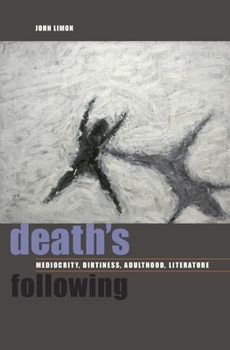Death's Following: Mediocrity, Dirtiness, Adulthood, Literature
Select Format
Select Condition 
Book Overview
Almost all twentieth-century philosophy stresses the immanence of death in human life-as drive (Freud), as the context of Being (Heidegger), as the essence of our defining ethics (Levinas), or as language (de Man, Blanchot). In Death's Following, John Limon makes use of literary analysis (of Sebald, Bernhard, and Stoppard), cultural analysis, and autobiography to argue that death is best conceived as always transcendentally beyond ourselves, neither...
Format:Hardcover
Language:English
ISBN:082324279X
ISBN13:9780823242795
Release Date:August 2012
Publisher:Fordham University Press
Length:212 Pages
Weight:0.90 lbs.
Dimensions:0.7" x 6.1" x 9.0"
Customer Reviews
0 rating





